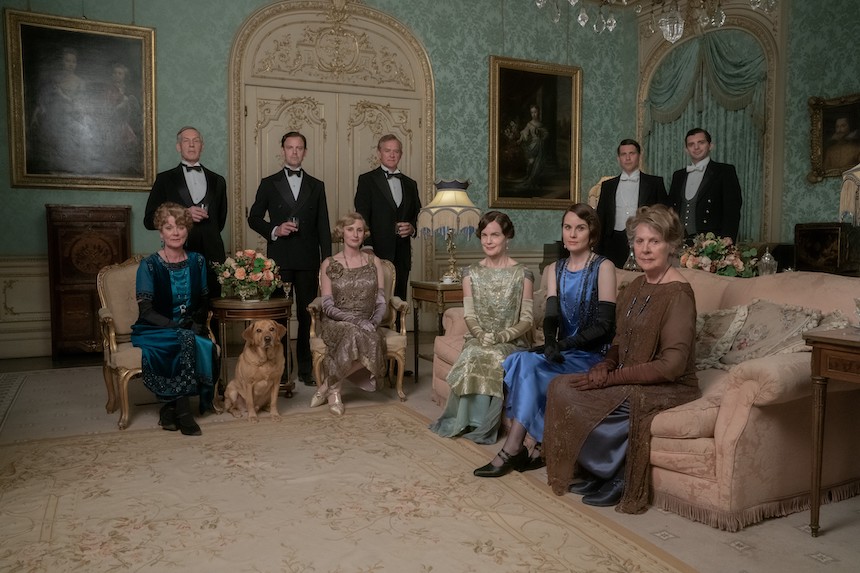Review: DOWNTON ABBEY: A NEW ERA, More of the Same, Except Slightly Different

Cannily marketed as an old-school, throwback “Motion Picture Event” three years ago to eager pre-pandemic audiences, Downtown Abbey, the big-screen sequel to the UK -created and -set series that ran across six seasons and 52 episodes, substantially outpaced its modest production budget by a factor of ten at the global box office. Apparently, audiences were eager for what Downton Abbey was selling: an unqualified, unreserved, ultimately uncritical nostalgia for interwar British aristocracy (in other words, a rosy-hued conservative fantasy).
Given the big-screen sequel's better (and bigger) than expected box-office revenue, another entry seemed all but inevitable. Marketed this time as the “Motion Picture Event of the Year” with barely a hint of hyperbole this time out, the sequel adds a not entirely accurate subtitle, “A New Era,” to distinguish it from its progenitor, but otherwise follows a comfortingly familiar formula, mixing audience-friendly soap opera tropes with a deeply uncritical, unironic embrace of the pre-WWII British aristocracy and the inflexible, rigid class system that supported, reinforced, and elevated their wealth, status, and position above everyone else.
Written by series creator Julian Fellowes (The Gilded Age, The English Game, Gosford Park) and directed by Simon Curtis (Goodbye Christopher Robin, Woman in Gold, My Week with Marilyn), Downton Abbey: A New Era picks up soon after the events of its predecessor. The Great Depression, the rise of fascism in Europe, and the ascendancy of Hitler are still years away, leaving the sprawling Grantham clan more or less where we left them, blissfully enjoying materially rich, comfortable lives on the family estate while a full-time staff of roughly 25-30 serve their every need.
Their lives mix, of course, but only within specific, socially circumscribed boundaries. Only ex-chauffeur Tom Branson (Allen Leech), has made the sizable jump from the servant class to the aristocratic one and only because he married into Grantham clan.
Adding a predictable dollop of tragedy to remind viewers that the Grantham clan is just like us, Branson gained a daughter, but lost his wife to childbirth. Downton Abbey: A New Era, however, gave Branson a new lease on the aristocracy, matching him up with a new romantic partner, Lucy Smith (Tuppence Middleton), with a sizable dowry of her own and a suitably grandiose marriage in the opening scenes of the sequel.
As with its television and cinematic predecessors, Downton Abbey: A New Era circles back to periodic reminders of the cycle of life (birth, marriage, death). It shouldn’t come as a surprise then that Fellowes bookends Downton Abbey: A New Era with a marriage and the birth of a new addition to the aristocracy.
In between, Fellowes inserts a double-headed plot involving a surprise inheritance, a sumptuous villa in France, for Violet Crawley (Maggie Smith), the Dowager Countess of Grantham, from a newly dead, never-before-mentioned Frenchmen, a development that sends her son, Lord Robert Grantham (Hugh Bonneville), into a perpetual state of confusion and angst at the possibility of his mother’s relationship with another man not his biological father. As always, Lord Robert’s American-born wife, Lady Cora (Elizabeth McGovern), gently guides her husband through his fraught emotional state.
While Lord and Lady Grantham, plus an entourage, decide to visit the French villa, another development, the arrival of a film company to the well-manicured grounds of Downton Abbey, create the usual set of low-stakes complications for anyone who remains behind at the family estate, including Cora and Robert’s daughter, Lady Mary Talbot (Michelle Dockery), the de facto head of household, and Thomas Barrow (Robert James-Collier), the relatively new head butler and successor to the gruff, rule-bound Mr. Carson (Jim Carter).
For Lady Mary, it’s both navigating the organizational chaos associated with on-location filmmaking and keeping her burgeoning feelings towards the film’s producer-director, Jack Barber (Hugh Dancy, Hannibal). For Barrow, a closeted gay man attempting to survive in a deeply inhospitable era, a personal connection with the film’s star, Guy Dexter (Dominic West), promises the possibility of a different, more fulfilling life.
Downton Abbey: A New Era cuts between the slightly dull French villa scenes and Downton Abbey proper, as the arrival of “talkies,” an idea lifted wholesale from the far superior Singin’ in the Rain, spells imminent doom both for the production and the film’s seemingly sophisticated, platinum-blonde co-star, Myrna Dalgleish (Laura Haddock). Myrna’s movie-star success, however, hasn’t been enough to hide her working-class British accent, putting her future as a working actress, let alone a commercially viable movie star, in serious doubt. Not surprisingly, given Fellowes’s conservative leanings, Myrna quickly emerges as an object of ridicule worthy of contempt and laughter, at least until she sheds said pretensions and re-embraces her working-class origins, risible accent and all.
Myrna comes closest to the status or function of villain in Downton Abbey: A New Era, but the real villain here isn’t an individual or even a social class (servants) who expect and want more out of their lives than serving the aristocracy, but a rapidly changing world that will, in time, not just marginalize the earnest, well-meaning Grantham clan and everyone like them, another world war that leave the British Empire in tatters and its colonies untethered from the imperial yoke. It remains to be seen, though, whether Fellowes will take the Grantham clan into the 1930s and beyond, upending and subverting everything they know, love, and believe in the process.
Downton Abbey: A New Era opens theatrically in North America on Friday, May 20.
Downton Abbey: A New Era
Director(s)
- Simon Curtis
Writer(s)
- Julian Fellowes
Cast
- Hugh Bonneville
- Jim Carter
- Michelle Dockery







